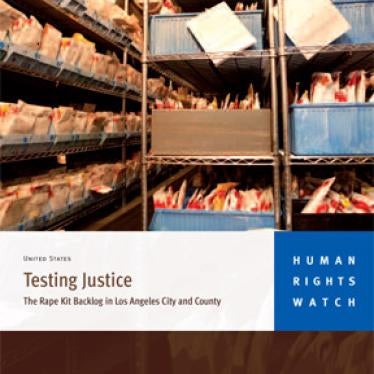(Los Angeles) - Sheriff Lee Baca of Los Angeles County has agreed to direct over $3 million in his FY 2010 budget to testing physical evidence in rape cases for DNA matches, Los Angeles County Supervisor Zev Yaroslavsky has announced. The announcement came in a letter to Human Rights Watch, which has been researching the backlog in untested evidence in rape cases.
The funding commitment is an essential step for the county to eliminate its backlog -currently estimated at 4,071 cases - in testing the collections of evidence, known as rape kits. But a comprehensive plan on rape kit testing and increased oversight from the County Board of Supervisors are also essential to successful testing of the kits, Human Rights Watch said. The letter from Yaroslavsky was dated September 1, 2009.
"The sheriff's commitment of vital funds for rape kit testing, especially in the midst of a significant budget crisis, sends an important message to rape victims that seeking justice in their cases matters," said Sarah Tofte, US Program researcher at Human Rights Watch and author of "Testing Justice: The Rape Kit Backlog in Los Angeles City and County."
In the letter, Yaroslavsky wrote that Baca would apply $2.3 million of his budget to rape kit testing, and an additional $700,000 to hire crime lab staff necessary to increase the county's testing capacity. Yaroslavsky also noted that he has asked the county to find matching funds in its FY 2011 budget for the sheriff's rape kit backlog testing program.
In "Testing Justice," released in March, Human Rights Watch reported that at least 5,000 untested rape kits were in the Sheriff's Department's evidence storage facilities. Testing a rape kit can identify a suspect, connect evidence from apparently unrelated crimes, corroborate the victim's account, and exonerate innocent suspects. It can bolster investigations, and move more rape cases through the criminal justice system.
In June, the Sheriff's Department announced it had suspended rape kit testing due to a lack of funds, and that, of the 200 kits that had been tested prior to June 2009, only six profiles were entered into the DNA database for possible criminal and crime scene matches. On September 1, the Sheriff's Department announced that, of the 283 rape kits tested so far from the backlog, 42 profiles had been entered into the DNA databank, leading to eight arrests.
Human Rights Watch urged the Sheriff's Department to develop a detailed plan for rape kit testing and the County Board of Supervisors to enhance its oversight of the department's progress.
While the sheriff is clearly making progress on rape kit testing, a public, detailed, and comprehensive testing plan is still needed, Human Rights Watch said. Such a plan would lay out meaningful benchmarks and explain how the department will develop investigative leads from the testing results.
"Eliminating the rape kit backlog is the first step in trying to obtain justice for rape victims," Tofte said. "Then it's essential to follow up the leads from test results with an effective investigation."






